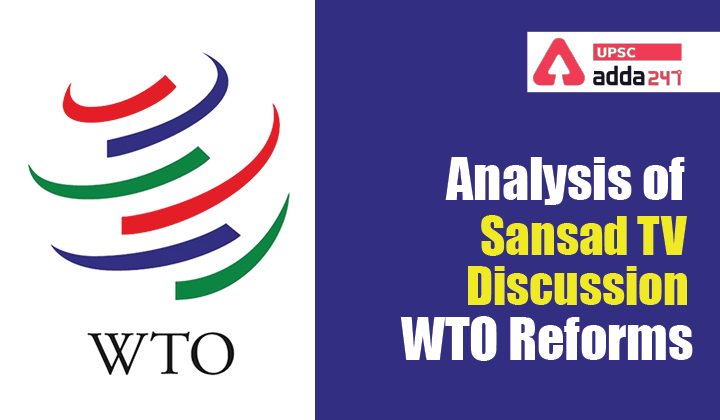Table of Contents
Context
All eyes are on the 12th Ministerial Conference of WTO which is scheduled to take place from 30th November to 3rd December in Geneva and which will be attended by trade ministers and other senior officials from the organisation’s 164 members. This highest decision-making body will seek to address the challenges of making a rules-based multilateral trading system more relevant in a world where bilateral, regional, and mega-regional trade agreements have proliferated.
Background
- The event(WTO’s 12th Ministerial Conference), delayed by two years, presents an excellent opportunity to move towards reviving the multilateral trading system that has long suffered from recurrent deadlocks, the weakening of its dispute settlement mechanism and broken trust among the members.
- Although the Covid-19 pandemic has accentuated the adverse impacts on the global trade front and exerted new pressures on WTO, desires still run high in many governments to integrate into the global economy, as documented in the Global Trade Alert Report, October 2020.
Which issues will be discussed?
It will consider a raft of critical issues—in which India has major stakes—such as WTO reforms on the special and differentiated treatment of developing countries, public procurement for food security, response to Covid-19, including a patent waiver proposal floated by India and South Africa to fight the pandemic, among others.
India’s Concern
- India is opposed to developed countries linking WTO reforms S&DT.
- India is concerned that developed nations are pushing on reforms that would dilute provisions on S&DT (special and differential treatment) for developing countries.
- India argued that to deprive countries, having a low per capita income of $600-3,000, of differentiated treatment and to place them alongside those having $60,000-80,000 per capita income is “grossly unfair”.
- India has also warned that there is an attempt to drive a wedge between developing and least developing countries on public stockholding and sought a permanent solution on an issue that is critical for procurement by agencies such as the Food Corporation of India.
- However, India is open to discussions on the classification of developing countries and in favour of reforming the WTO for making it more productive.
What is S&DT(special and differential treatment)
- S&DT allows developing and poor (less developed) countries to enjoy certain benefits, including taking longer time periods for implementing agreements and binding commitments, and measures to increase trading opportunities for them.
- Currently, any WTO member can designate itself as a developing country and avail these benefits.
- The US, for instance, believes self-declaration puts the WTO on a path to failed negotiations and institutional irrelevance.
WTO and Global Trade
- The World Trade Organization is the principal forum for setting the rules of international trade.
- For the past two and a half decades, it has helped reduce barriers to trade in both goods and services and created a dispute resolution system that supporters say reduced the threat of trade wars.
- However, with negotiations on a comprehensive development agenda foundering due to disagreements, the WTO is under considerable pressure to achieve meaningful results.
- For example, The committee on agriculture is yet to find a solution to the issue of Public Stockholding.
How to make the WTO fit for purpose in today’s world of trade?
- The issue of WTO reform has been raised by the organization’s members in various WTO bodies in recent years, with many recognizing the need to update rules written more than a quarter of a century ago.
- These not only included tackling new issues like climate change, pandemic response and the digital economy, but also ensuring the WTO can better address matters that have been on its negotiating agenda for years, such as agriculture, disciplines on fisheries subsidies, and special and differential treatment for developing and least-developed countries.
- The COVID-19 crisis has shown the world the profound asymmetries that exist in many economic, social and health aspects.
- The post-pandemic reality should be an opportunity to create a new system based on equality and solidarity which is truly effective.
- The multilateral trading system needs to be part of a mechanism that promotes wellbeing globally.
- WTO reform should focus on the issues that are central to the interests of developing and least developed countries and that have been the subject of ongoing WTO negotiations for years.
- Strengthening special and differential treatment, agriculture issues such as domestic support, the special safeguard mechanism and public stockholding, are crucial for addressing food and livelihood needs.
- Ensuring future digital trade rules allow sufficient policy space for developing countries, simplifying notification requirements, and reforming rules under the WTO’s TRIPS Agreement to strengthen access to innovation important priorities.
What do WTO members need to do?
WTO members need to make progress at the WTO’s upcoming 12th Ministerial Conference in three areas:
- Promoting the better functioning of the WTO by getting the negotiating function working again;
- modernizing existing rules in areas where there is a willingness to do more, such as health and the environment, e-commerce and women’s economic empowerment; and
- promoting free and fair trade by tackling market-distorting practices and making sure that members take on obligations commensurate with their size and level of development.
Way forward
- WTO rulebook is struggling to keep pace with both the global challenges of the present and the industries of the future.
- The approaching Ministerial Conference is an ideal moment for us to reflect on the need to address those challenges — in ways that are inclusive, flexible and transparent — and which deliver the results which members want to see.
- India’s best strategy at the ministerial should be to make constructive suggestions on strengthening WTO as it has vital interests in a rules-based multilateral trading order while firmly standing up for the developing world.



 TSPSC Group 1 Question Paper 2024, Downl...
TSPSC Group 1 Question Paper 2024, Downl...
 TSPSC Group 1 Answer key 2024 Out, Downl...
TSPSC Group 1 Answer key 2024 Out, Downl...
 UPSC Prelims 2024 Question Paper, Downlo...
UPSC Prelims 2024 Question Paper, Downlo...





